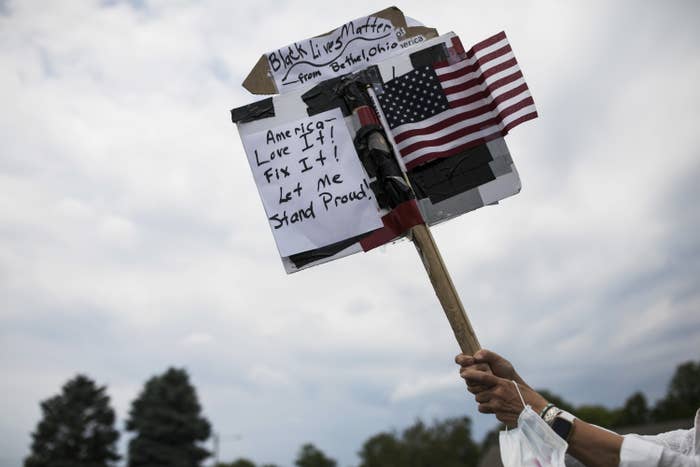
Lois Dennis started teaching second grade in the village of Bethel, Ohio — official population just under 2,800 — back in 1976. People in town call her Mrs. Dennis. And that’s the name people used online when they started denouncing what happened that Sunday afternoon in June when Bethel made national news for an explosion of violence on its streets: I can’t believe they did that to Mrs. Dennis.
Lois’s adult daughter, Andrea, was visiting from Chicago. Earlier in the week, they’d heard that local substitute history teacher Alicia Gee was planning a small demonstration in Bethel in solidarity with Black Lives Matter. They made some signs on poster board, and Lois put on a blue T-shirt with “I TEACH” and the Superman logo.
They parked at the middle school and began walking east on Plane Street, the main thoroughfare through the village. “That’s when we were accosted by the counterprotesters,” Andrea recalled. “They started pushing us, being aggressive, yelling at us. We couldn’t believe it. We were stunned.”
On one side of the street, they saw around 50 Bethel residents — teachers, city council members, hairdressers, retirees — who’d shown up for the BLM demonstration. On the other, there were hundreds of people, including representatives from four different biker gangs, who, at the invitation of a local construction worker, had come to “protect” the town from looters and rioters and rumored antifa. Ultimately, the number of people “uptown,” as Bethel residents refer to the center of the village, swelled to over 800.
Watching footage of the day, you can see the energy grow darker and heavier. You can hear a man yell “you came to the wrong fucking town,” a woman scream “you’re supporting the goddamn niggers,” another man threaten to “break your fucking jaw, bitch.” You can see rifles and handguns and a literal bag full of baseball bats. You can see a woman in a pink sweatshirt repeatedly calling a Black woman the n-word. You can see people grabbing sign after sign from the pro-BLM demonstrators and ripping them to shreds. You can see a biker come up behind Nick Reardon and punch him directly in the skull. And you can see the police officers watching the encounter do nothing.
“People were screaming at us to go back where we came from,” Anwen Darcy, who attended the demonstration with her mom and sister, recalled. “But I was looking around, and I saw Mrs. Dennis, who’d been a teacher for 30 years. I saw my mom, who’d been on the PTA for years and served as the drama director. I saw the woman who ran all the prom fundraisers and a city councilman. The people yelling at us weren’t from here, because if they were, they would’ve known we were home.”
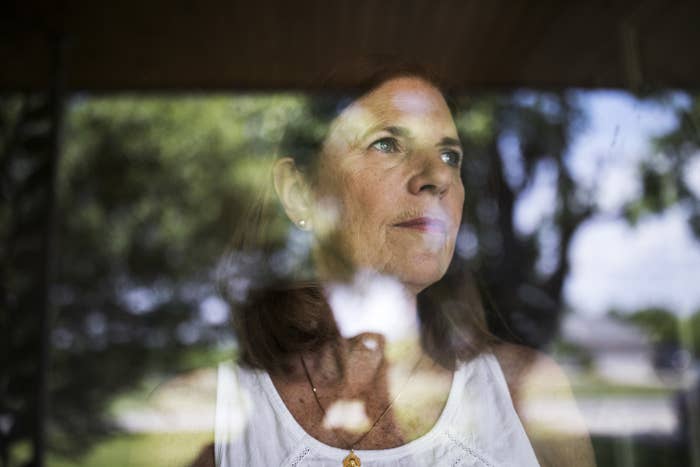
When Lois and Andrea first entered the scene, someone yanked Lois’s sign and tore it in half. She didn’t recognize that person, or any of the others pushing her around. But later, once she’d made it to the rest of the demonstrators, she looked across the street. Like everyone else, she saw people she knew. She got in a “stare down,” as her daughter later described, with one of her former colleagues.
“Lois, I cannot believe you’re here,” the other teacher yelled.
Andrea and her mom knew it was time to go. When they arrived home, Lois walked straight to the backyard to debrief with her husband and drink a glass of water. Andrea thought her mom would be mad at her. But Lois was resolute. “I wanted to be there,” she said. “I needed to be there.”
Lois Dennis needed to be there, she later told me, because when she was a kid, growing up 30 minutes away in Ripley, Ohio, she would spend her summers at the local pool. From that pool, she could see a nearby hillside. And on that hillside, silently watching the kids in the pool, were her Black classmates. The schools weren’t segregated. But private pools still could be. “I never questioned or asked why. That’s why I want to stand with Black Lives Matter — that sort of quiet racism, that’s accepted for so many years, and never questioned.”
A lot of people have stories like Lois’s. Some of those stories are about how a place like Bethel, whose official slogan is “small town, big heart,” have ignored or left unexamined years of overt and covert racism. But others have different stories: of what it felt like to be the only Black person, the only Filipino family, the only mixed kid in your class. Stories of isolation, and fear, and of trying to make yourself invisible.
The people who showed up to “protect” the town say a Black Lives Matter demonstration doesn’t belong in a place like Bethel, Ohio. There’s no need, they say, for those sorts of conversations. Others blame the demonstrators for giving Bethel a bad name: for the dozens of articles in the national press, the outsiders flooding local Facebook comment sections, the Wikipedia entry for the village briefly changed to describe it as “composed of many, many racists.” After what happened on June 14, the village instituted a curfew — the first anyone in town can remember.
“I’ve known Lois Dennis and her husband my whole life,” Andrew Stober, who runs the Facebook Group “Bethel Bitching Together,” told me. “I love them and respect them. But was it really the right thing to do, bringing that protest here? It’s okay to have one of those in the city, but in a predominantly white town — what they were doing was basically doing was inviting racists in.”
If there hadn’t been a protest, the reasoning goes, there wouldn’t have been a problem, and everything in Bethel would’ve been like it always has been: just fine. But what happened on that Sunday afternoon showed just how unsustainable that belief has become.
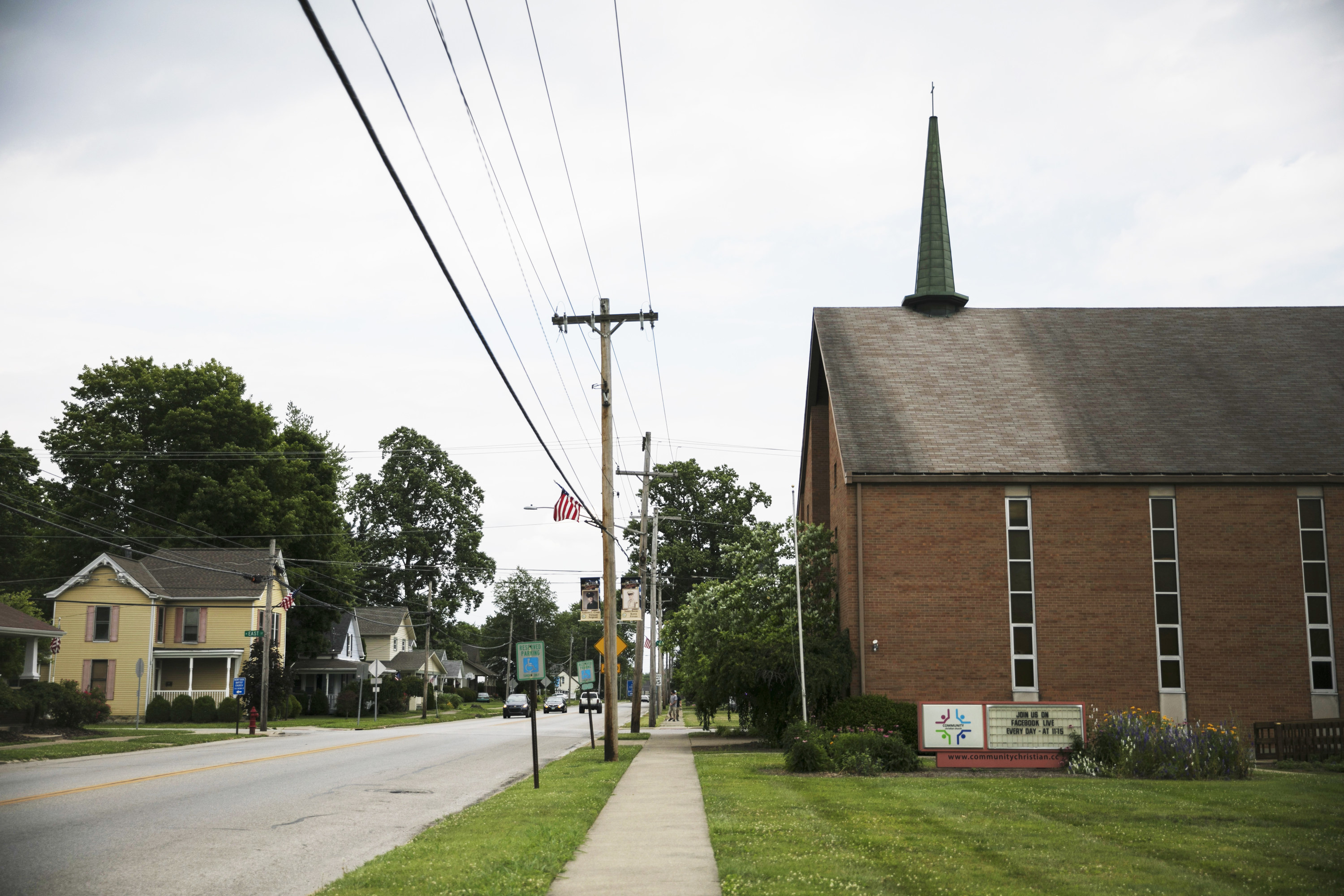
Bethel is at once wholly singular and totally indistinguishable from hundreds of other towns of its size and stature scattered across the United States. You can still buy a home, a pretty big one, for under $100,000, and one of several foreclosed properties for significantly less. There’s one high school, one middle school, one Ben Franklin five-and-dime — where people go for everything from quilting supplies to Halloween costumes — and one feed store.
It feels like there’s about one church per person, but none of them have many young people anymore. In 2016, 68.4% of the county voted for Trump. The last time the county went for a Democrat in a presidential election, it was for Lyndon B. Johnson. There’s an old movie theater in downtown Bethel, opened in 1938. For years, it was the pride of the village. In 2015, a Kickstarter to raise enough money to buy a digital projector stalled out at $2,400. Now there’s just a fading Ant-Man poster. There used to be a local paper, but that got absorbed into a regional one. There used to be a solid grocery store, but that’s turned into a Save-a-Lot, a low-cost cousin to Grocery Outlet.
“We’ve got the trifecta,” one resident said. “Dollar General, Dollar Tree, and Family Dollar.” “On the main drag, there’s always a business trying to make it,” Laurie Jones-Dick, who’s lived in town since 1977, told me. “It’ll be there for a few months, maybe a few years. But then it’s gone.”
None of this is a new story in rural America. But to those who’ve watched Bethel’s slow decline, that doesn’t mean it isn’t deeply felt. A lot of the young people grow up and go away. Others stay but struggle to find work outside the schools or the service industry. People don’t talk a lot about the opioids or the meth, but everyone knows someone who’s died in the last decade from one or the other.
Community members fought for years to get a levy passed to support the village’s schools. When the local pool was sold to the city, the insurance costs were too high, and officials shut it down entirely. A smattering of events, fairs, and festivals in the area have been cut for lack of funding. There’s still a Christmas parade, but the remaining activities are church-affiliated in some way. A few years ago, the village’s one non-chain restaurant, the Blue Haven, famous for its homemade pies, shut its doors. “After Sunday, people keep saying, you know, if the Blue Haven was still around, all of this never would’ve happened,” Andrea Dennis told me.
“There aren’t many events to look forward to anymore,” Anwen Darcy explained. “Things like Pioneer Days or whatever, it might not sound like a big deal, but that’s the stuff that knits a community together. Now it’s just a bunch of people loosely living together in the same place.”
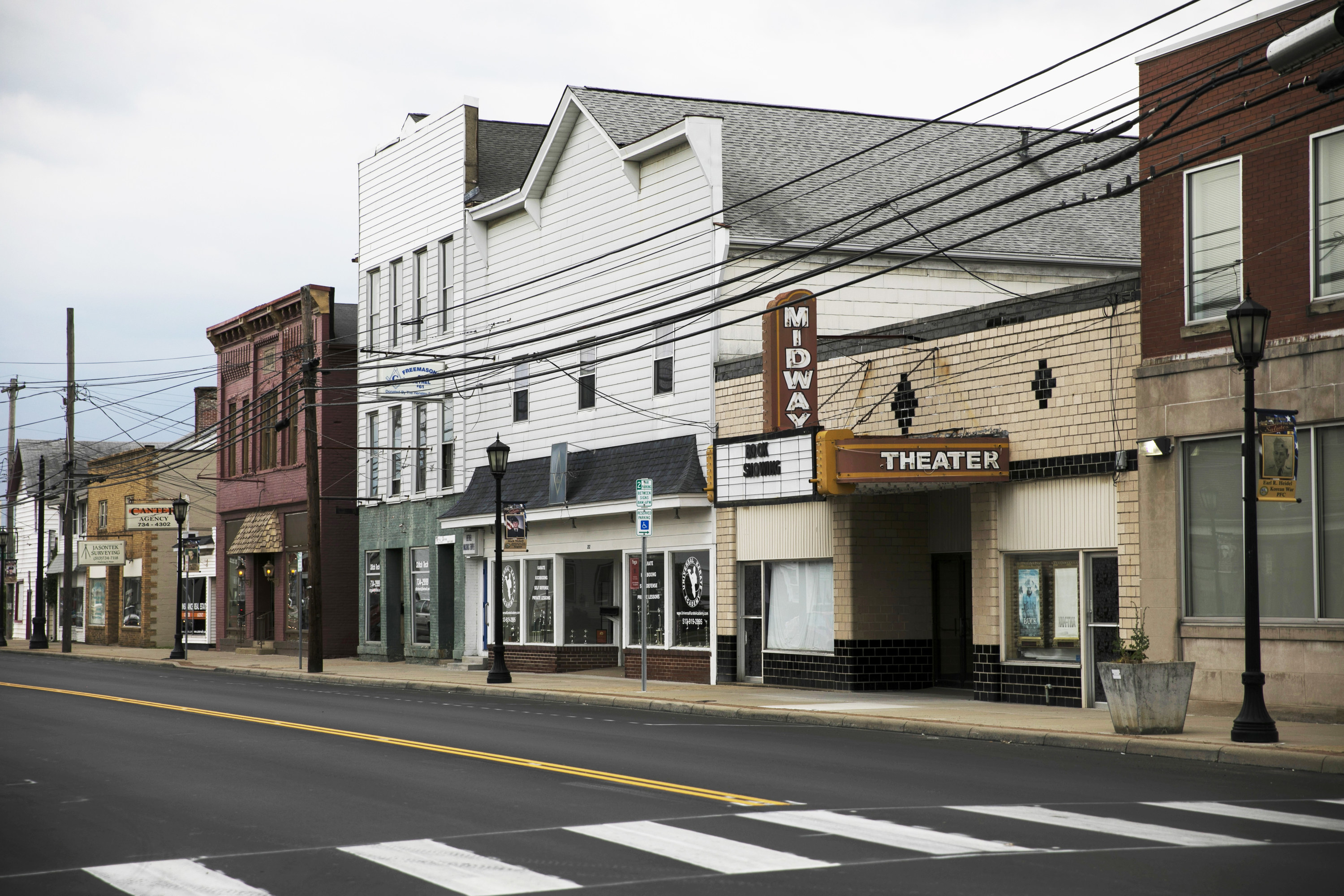
And that place is a distinctly Ohioan version of Appalachia. As one local saying goes, it’s “as far North as you can be and not be South, and as far South as you can be and not be North.” Several homes in the uptown area, as the center of the village is called, were stops on the Underground Railroad. In 1844, former US senator Thomas Morris, a Bethel resident, ran for vice president under a third party advocating to abolish slavery. The first mayor of the town was the father of President Ulysses S. Grant.
Still, when the Klan revived across America in the 1910s, more than 1,000 people joined in surrounding Clermont County, and local newspapers recounted its activities the same way they’d cover the work of, say, the local Red Cross. Nearly a century later, KKK literature, some of it aimed at recruitment, began popping up all over Bethel — including on the doorstep of James and Olivia Hundley and their six children. “This is something I would expect to tell my children that their ancestors experienced,” Olivia Hundley said in 2005. “Nothing that they would actually have to experience themselves.” These days, few in town can remember that family, or when they moved.
On the bus to away football games, a former cheerleader reported, the players would talk about “beating those niggers” on the opposing team. An administrator at a local school, according to one former teacher, used to brag about going to the “race riots” in the ‘60s with baseball bats. Another teacher posted on Facebook that just this year, a white student told a student of color that “his family would have owned her,” while another raised his fist, in class, and yelled “white power!”
Guadalupe Rodriguez, who graduated from high school this spring, arrived in Bethel in third grade. “For years I would tell myself that people didn’t really do much, they just made fun of my name,” she said. “But I guess I just got used to it. Now that I’ve grown up, I realize how differently I was treated. There are so many people in the community who supported me, but then there was this whole other group of people that just didn’t think I should exist.”
The shock of these stories has faded for many white residents — or has just been ignored. They maintain that Bethel is not racist; there’s no need for any fundamental reexamination of how power and race align in a town that’s more than 96% white. “Mayhem, racism, and anger does not describe this village in any way,” Village Council member Bryan Coogan told me in an email. “I have lived all over this great country and moved to Bethel to stay away from just the sort of stuff I just described.”
As Joe Manning, a local ironworker upset by the demonstration, put it on Facebook: “There hasn’t been any trouble in this town until all this shit started. I just don’t understand why people don’t just keep to themselves.”
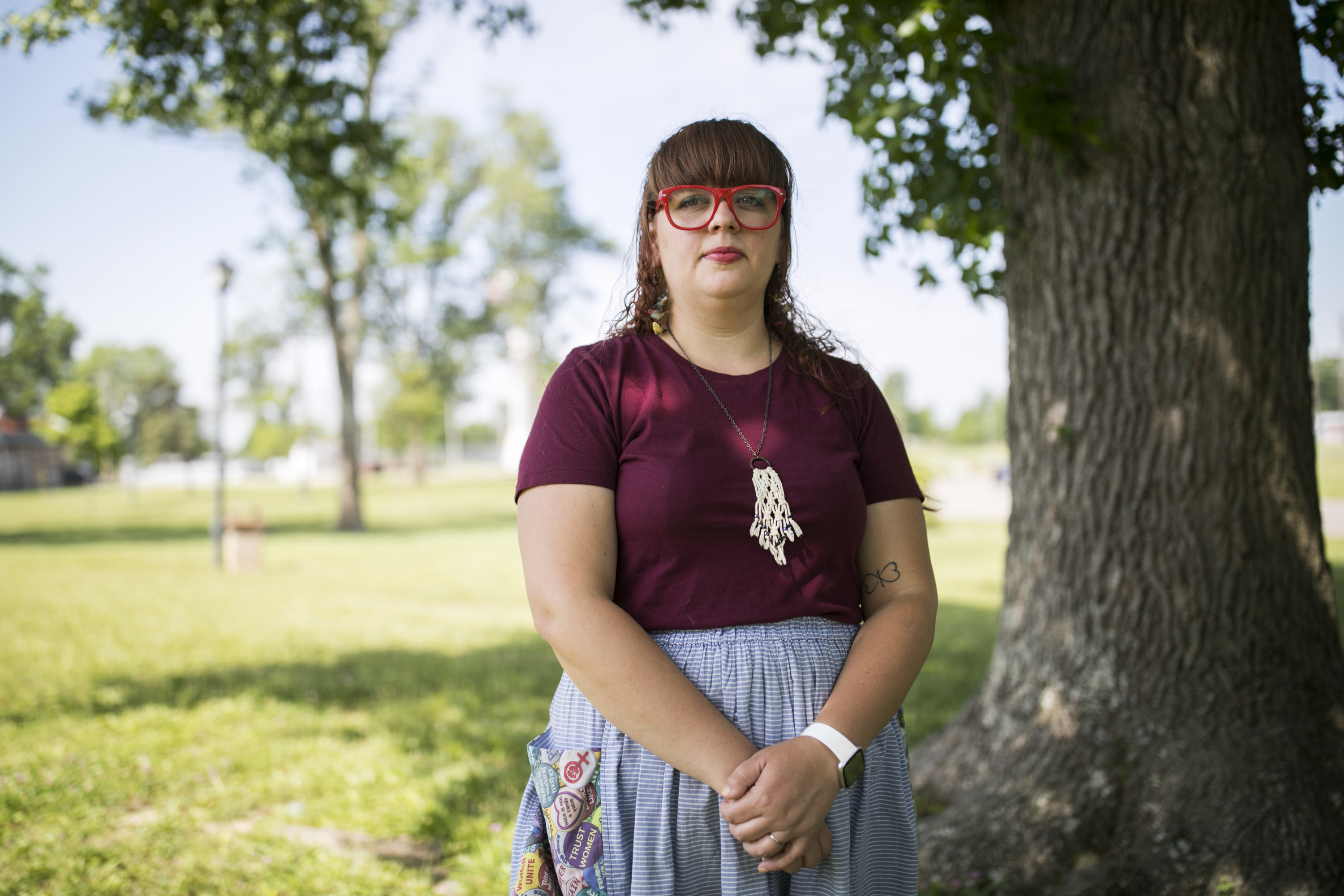
Alicia Gee has chunky auburn bangs, oversized glasses with thick red frames, and the general look of a high school art teacher on a teen CW comedy. Like many people who showed up for the demonstration that she helped plan on Sunday, she’s lived her entire life in Bethel, marrying her high school sweetheart and raising two children.
Apart from substitute teaching, she has served as a children’s minister, worked for Girl Scouts of Western Ohio, completed her master’s in education, and, most recently, helps run a local art collective. She’s a third-generation Bethel resident, and her father, Ron Dunn, is a member of the Village Council.
When Gee started putting together the idea for a demonstration, she had been inspired by the small gatherings and vigils in towns just as small as Bethel, and just as conservative. But Gee was also mindful about how her community would view the event. “We knew that whatever we chose to do had to be simple,” she said, “but we also wanted to make it a big tent to include people.” They were careful to label the gathering as a demonstration — a way of showing up in solidarity. Not a protest.
The organizers didn’t want to limit the gathering to people they already knew — which meant posting it on the Facebook Group that has filled the vacuum left by the departure of the local news. Gee posted the announcement late at night. The next morning when she woke up, there were messages on the post and in her inbox with the same theme: You can’t bring this into our town.
At this point, protests and demonstrations had been happening all over the United States for weeks. Depending on where someone got their news, and how much credence they gave to Facebook rumors, it was easy to believe that such gatherings would devolve into riot and ruin. “There’s this common narrative,” Gee explained, “that if someone stands for Black Lives, then it’s automatically a ‘protest.’ And if it’s a protest, then it’s automatically a riot, which is automatically looting, and busing in people who will swarm the town and destroy it.”
And the antifa rumors that had been working their way through small towns didn’t help. “I had a conversation with the mayor, and he wanted to know if any of the organizers were antifa,” Gee told me. “And he had this very confused look on his face when I told him that we’re all against fascism, but antifa isn’t, like, an organized group the way that he thought it was.”
When Gee was planning the demonstration, she imagined there would be a few people who showed up with Trump flags. Maybe someone would throw a soda at them. That was before she heard about the bikers.
The plans for a Black Lives Matter event pissed a lot of people off. But one of the people it upset was Lonnie Meade. Meade grew up in Bethel, installs floors, and, in his spare time, is a pretty successful drag racer. He posts frequently to Facebook, mixing memes about political correctness with photos of his cars and young daughter.
Several people told me they remembered Meade from high school in the ‘90s. After school, there wasn’t much else to do, and kids would put together fights in local barns. Lonnie was one of them. (Meade did not respond to multiple requests for an interview, other than to say that the fights were with boxing gloves, and that “I don’t want to speak to any media as a conservative white male that loves his country, the media twist it as if you’re a white supremacist or a ‘counter protesters’ and I am neither.”)
When Meade read about the demonstration, he began broadcasting on Facebook Live. “Sunday at 3 o’clock, they’re supposed to be bringing a Black Lives Matter,” he said. “I’m gonna tell you right now, I hope that everybody that feels like me, I hope we outnumber those people a thousand to one, and not let that shit happen here in our little town of Bethel.”
“You’re not going to bring hate to our town,” he continued. “We don’t have hate in it right now. You’re gonna bring hate.”
On the morning of the protest, Jason Eblin took the pulpit at Northside Baptist, a congregation that, most weeks, hovers between 40 and 50 people. Eblin moved to Bethel three years ago when the lead pastor at the church, Ben Hurst, was paralyzed in an accident. Eblin had served as associate pastor ever since. His wife grew up here, and her family all lives in town, but, he told me, “I’m still an outsider.”
Eblin knew that if he talked about Black Lives Matter in his sermon that Sunday, he would get “in some hot water.” But he also thought it would be irresponsible, a dereliction of duty, for the church not to address it. “I’ve been told that maybe this isn’t really the best time to talk about it,” he told me. “But how can we ignore it? Jesus spoke out about racism and prejudice, so if he can talk about it, so can we.”
In his sermon, Eblin said he’d seen one of Lonnie’s videos and heard people saying that there wasn’t anything wrong with Bethel — that everyone loves everyone. But then he recalled his own research as he talked to people before moving to the town. “It was confirmed by people, even in this church, that Bethel is known for its churches,” he said, “but also for being a racist town.”
“Is that an unfair statement about this town?” he asked his congregation. “Well, that’s its reputation. And if it’s unfounded, then what better way of trying to correct it than saying it’s not who we are? If someone’s trying to go through peacefully and say ‘Black lives matter’ [...] then say ‘yeah, Black lives matter.’ And I hope I matter to you. Because we all matter to the Lord.”
The bikers started showing up in Bethel a few hours after Eblin stepped down from the pulpit. They parked their motorcycles and began pacing the sidewalks. Meade went live on Facebook. “What I’m asking for is to come up here and protect your community,” he said. “I don’t know what’s going to go down for sure. I’ve seen three or four antifa people walking together with backpacks, scoping out the crowds and seeing what we have. It’s a pretty freaky situation, I won’t lie to you.”
The post, like the one before, was shared hundreds of times.
While Meade was broadcasting, Gee was out on the country roads, on her way back from picking up Guadalupe Rodriguez who lives, in her words, “in the middle of nowhere.” They didn’t have good service, but Gee started getting calls from people in town, saying the bikers were already there. Organizers made the decision to move the demonstration a block west, hoping to avoid confrontation.
As Gee set up water and Gatorade, Rodriguez, who’d been designated as the official documentarian, started taking photos. A few dozen demonstrators trickled in, and Gee walked back and forth, greeting them. Her dad was standing on the far end of the block and saw a group of eight “burly-looking men” headed their way. “Here they come,” he yelled.
More from Bethel, OH. My niece getting pummeled by bikers and local shitters.
At first, it was just a few dozen people headed their way. Then it was a few hundred. “At that point, something came over me,” Gee recalled. “I just thought, if this is what we have to do, this is what we have to do. I’m not running away.”
The bikers stayed on the other side of the street for a few minutes, but then they started crossing the street, encroaching more and more on the demonstration space. The handful of police officers there to supervise spaced themselves throughout the crowd, but could do little to keep them separated.
“It felt like a swarm,” Gee said. And in the middle of it was a white car with two women standing out of a moon roof, recording everything. One of those women, Kelly Fogwell, had gone to high school with Lonnie Meade. After graduation, she’d left town to teach and eventually go to grad school, but had returned home in 2014 to live with her mom, Kathy Newman, who stood beside her. They’d decided, even before the bikers arrived, that they’d stay in their car as an additional layer of protecting themselves from exposure to COVID-19.
Newman had grown up as one of nine kids on a farm in Kentucky without a phone or running water. She eventually made her way to college at the University of Cincinnati, where, in 1970, right after Kent State, she participated in a peace march through the streets of the city. “We didn’t know if we were going to get shot,” she recalled. She stepped back from political organizing while she raised her kids, but has reentered activism over the past decade. “I’ve been to a lot of protests, and most of them are very boring,” she said. “Especially since I don’t really like chanting.”
In the weeks leading up to the demonstration, Newman had been watching what had happened to protesters in Seattle, and Minneapolis, and New York. “I’ve watched videos on how to hold your hands if you get arrested, and what your legal rights are as a protester,” she told me. She got a gallon of milk, found an old paintball mask, and threw them both in the car, just in case.
But their problem wasn’t the police — that much was immediately apparent. Videos of the event, now viewed millions of times, showed men in motorcycle vests embroidered with BIKERS FOR TRUMP with baseball bats menacing everyone in their path. Some people yelled go home and yanked signs, while others hurled slurs and attempted to knock phones from the hands of those filming. If you were a demonstrator, just standing in place made you a target.
“I’ve never been in a situation where I’ve looked at so many faces and seen zero empathy,” Anwen Darcy said. “There was just no recognition that they were speaking to other human beings. We were just an obstacle to them. And it was so bizarre to have a guy in a confederate bandana tell me that I better watch where I go, because he’s going to take me to his truck and tear me apart. I heard it in the moment, and I was like, Whatever. But then you think about it when you get home, and you’re like, Oh, this is what he meant by that.”
“I’ve never been in the presence of so much palpable hate,” Laurie Jones-Dick, Darcy’s mother, said. “It was like the air was throbbing.”
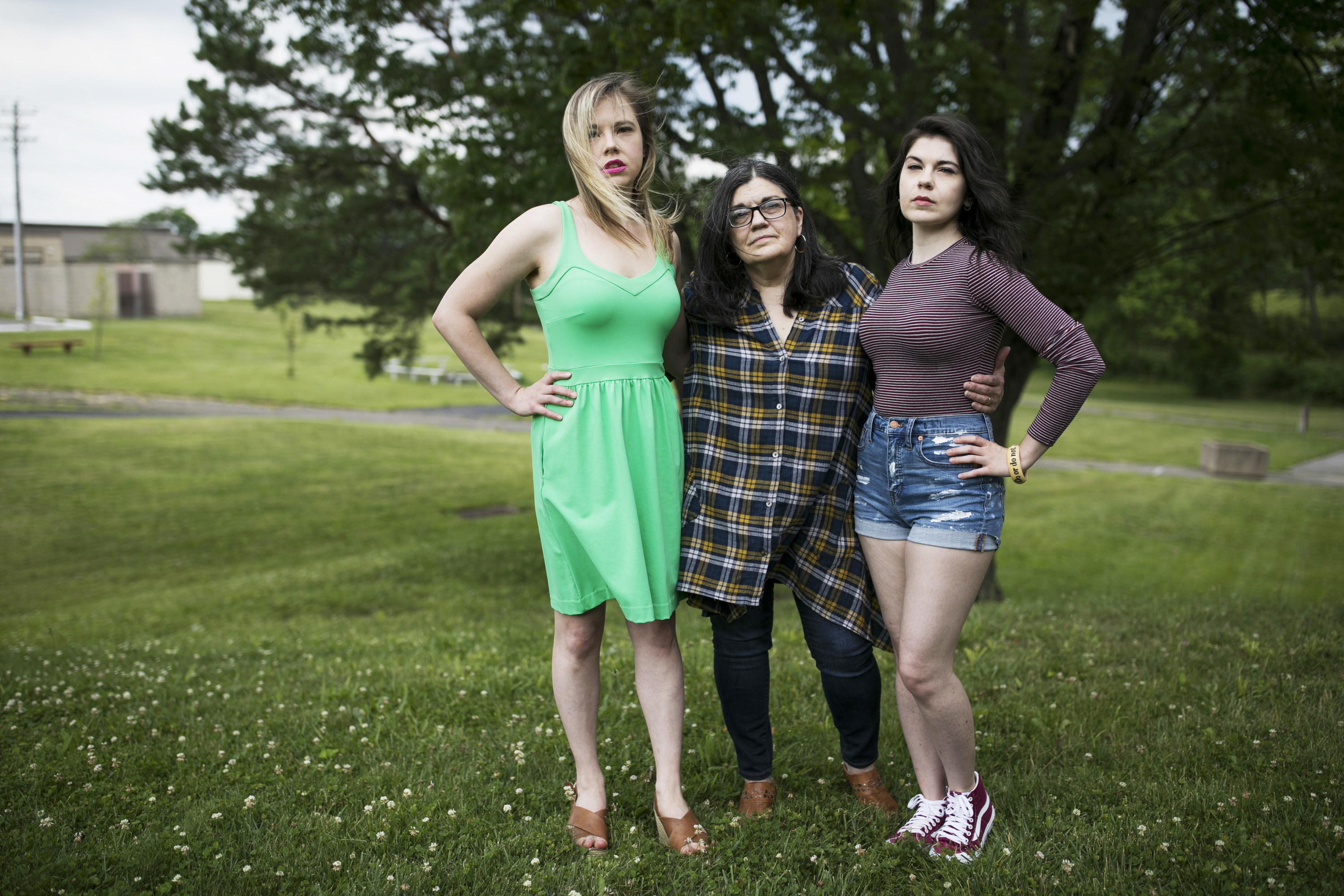
When Anwen Darcy was at the demonstration, getting called “a smug Princess Leia bitch” (her hair was in buns), she noticed there was a particular type of sign that seemed to enrage people on the other side: anything to do with “white privilege.”
“A lot of people have gotten something, whether it’s a little house or a truck or a piece of land, and they’re happy about it, and they don’t want it taken away,” she told me. To them, the protests signify a move to take that little bit that they do have, that they’ve worked so long to achieve.
“People said to me, ‘I’ve had cops follow me in stores. How dare you say I’ve had white privilege?’” Darcy said. “But if they get drunk and disorderly, they don’t get killed. They get tased and put in a drunk tank. They can’t see that sliver of privilege that’s still theirs. So see the idea of white privilege as a threat and devaluing their experience.”
“I get that they feel lost and terrified,” Darcy continued. “But I also wish that they could funnel that into something other than beating up women and children in the street.”
But other residents think that the people lining the street — including, in some cases, the bikers — weren’t mad or scared. They were just trying to protect the town from what they perceived as a very real outside threat. Andrew Stober, the moderator of the Facebook Group “Bethel Bitching Together,” knows that antifa stands for antifascist. He thinks that members of the group show up after BLM protests, vandalize and loot, and give BLM a bad name — and there was no reason to believe they wouldn’t show up in Bethel, too.
Stober started “Bethel Bitching Together” last year as a joke when another Facebook Group, “Bethel Banding Together,” seemed to devolve into, well, bitching. In his group, he lets people talk about whatever’s on their minds. He doesn’t moderate much, but has a zero tolerance policy, he said, for slurs and racists. He likes to think of himself as a pretty open-minded, curious guy. He went to college. He’s been to seven countries. He’s a volunteer wrestling coach for elementary school kids. He lived for years in Over-the-Rhine, the predominantly Black area of Cincinnati. One time he got robbed and nearly stabbed in downtown Cincinnati, but “instead of being a racist about it,” he just went down to the block where he had been attacked and got a job as a bouncer. These days, he spends his time at his fishing camp on the Ohio River, running his window cleaning business, and hanging out with his son.
In the week leading up to the protest, Stober saw Facebook posts alleging that antifa had plans to appear in the area. He couldn’t confirm them, but thought the threat should be taken seriously. “When antifa threatens to burn down stuff within two miles of your town, don’t you go down and protect businesses?” he asked me. “I saw Lonnie’s videos, and I was like, Hey, you know what? Good for you. Protect your town. He wasn’t saying anything racist. He was just standing up and saying that stuff’s not gonna come here.”
Stober said that if he still owned property uptown, where the demonstration took place, he would’ve been there. Instead, he stayed home to work in the garden. But his fellow wrestling coach Jeffrey Botts was there, guarding his family’s veterinary practice, and Stober applauded him. “We worked our whole lives for these businesses,” he said. “God bless those people for protecting their own stuff.”
He hates that Bethel’s name has been smeared — especially by people who’ve moved away. “It’s hard to see the posts,” he said, “talking about this good old boy mentality, saying we’re all rednecks. But I’m a college-educated, world-traveling window cleaner. These people say they’re so glad they left Bethel, that they have interracial children and now feel like they can’t come back, and I’m like, Be the change, don’t be the problem.”
“They walked away, started a life somewhere, haven’t been back in so many years,” Stober continued. “It’s easy to criticize from afar. I don’t know one person who’s really racist. Do I think people get singled out by the police? I do. But I don’t think it happens in Bethel.”
In one of Lonnie Meade’s Facebook videos describing and defending what happened in Bethel, he mentions a Black student from his high school — someone, he said, whom he never had any problems with. That high school student went by Ernie back then. Now he goes by Ray, and he lives in Cincinnati with his girlfriend and young son.
When I reached Ray Riley in the week after the demonstration, he’d watched about as much of the videos as he felt was necessary. But he’d had years to think about his time in Bethel as the only Black kid, the sort of person whom people like Meade bring up as evidence of their lack of racism.
“My time there was like the definition of the phrase ‘social isolation,’” he told me. “I had a couple of people that I hung out with from time to time, one from a town over. But I had very few friends in the actual school.” He arrived in Bethel in middle school and moved in with his stepdad, who was white. “As far as race relations go, he wasn’t the best informed,” Riley said. “He wasn’t savvy enough to understand that I wouldn’t be living in the same America as he would. He tried to raise me to go through life the same way he did. And that just wasn’t the way it worked.”
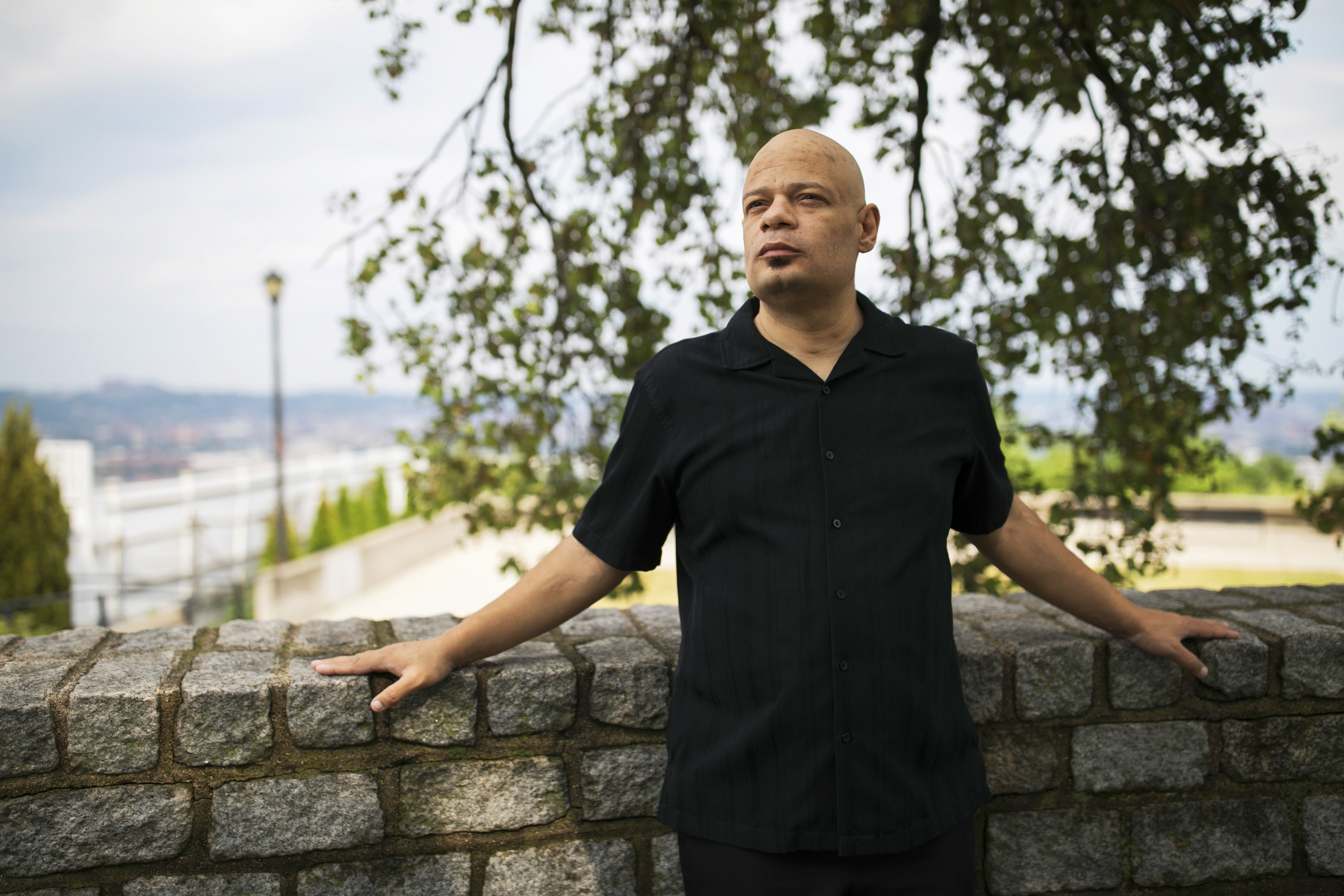
Riley described himself as a big, athletic guy in high school, which is part of why, he says, people didn’t bully him physically. “But they bullied me in their own ways,” he said. The fathers of the girls he dated didn’t like him. “I got the feeling that if I wasn’t a minority, they wouldn’t have been quite as opposed,” he said. “Sometimes there are just, let’s say, subtle hints you can pick up on.”
“I was dismissed as kind of stupid by my teachers,” he said. “Which I don’t think I am.” He remembers Meade as someone on the periphery, always trying to start a fight, including a few times with him. It never happened, but it didn’t surprise him that Meade was behind what happened on Sunday — or that the rest of the town reacted the way it did.
“I knew they were going to run into trouble,” he said. “The question was how much? There’s an undercurrent of hatred in that small town, in all those surrounding towns. I saw it. I swam in it. I survived it. I didn’t exactly thrive in it. The first chance I got, I ran like hell. Because they don’t like the other, and I was always the other.”
They can’t understand themselves as racist, Riley said, because they cannot empathize with the experience of it. They can’t see it because they haven’t felt it or listened when others described it. Their closest experience is hearing the phrase “Black lives matter” and thinking that it is actually racist against white people.
“They’ve been taught all their lives that if you work hard, everything’s gonna be just fine,” Riley said. “But they see now that they worked hard, and did the work, and they didn’t get what was promised. They’re so mad, and they turn that hatred inward and feel inadequate. But Trump says, ‘No, I can ease your pain. These people over there, they’re to blame. It’s their fault.’”
“People have been telling you that your bigotry is bad, and you should feel bad,” he continued. “But Trump is there to tell you: It’s good.”
It wasn’t until the end of our conversation that Riley started telling me all the things that had happened to him as a child in Bethel. He listed them offhandedly, like reciting the groceries he needed at the store. The police had stopped him dozens of times without cause. An officer used to refer to him as “Tyrone” every time he saw him. One time, when Riley entered a restaurant in a nearby town, a white dude started singing Dixie and replacing the words with racial slurs. Another time he was riding his 10-speed and turned around in a driveway, and saw someone come out onto the porch. It was one of his classmates. He started yelling: “Get out of my driveway, nigger.”
“I could tell you stories for hours,” he said. “At the time, I didn’t fully grasp how wrong it was. It was just my life.”
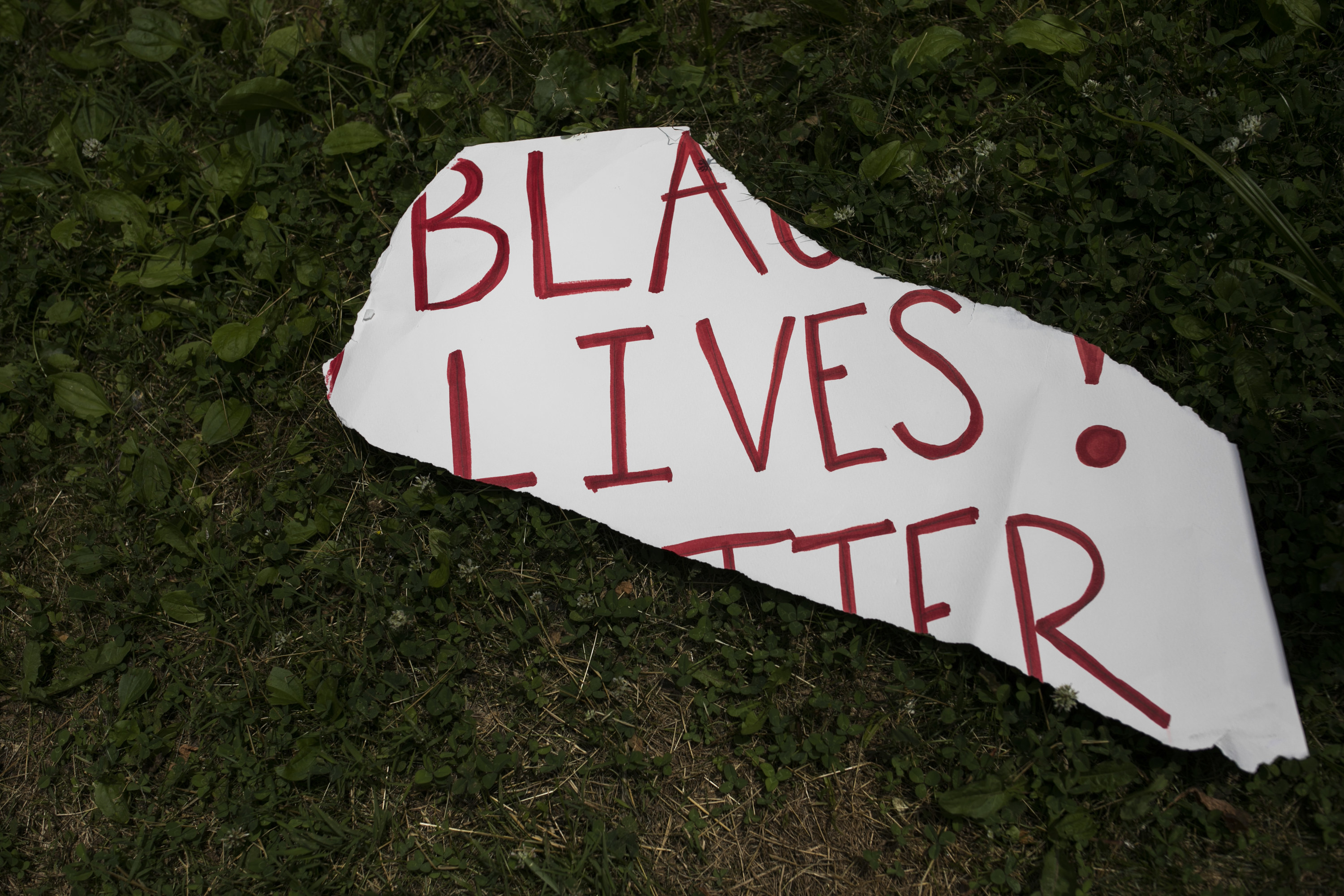
There was no local television news to document what happened in Bethel on that Sunday afternoon. Only video from phones, which spread quickly on Facebook, on Twitter, and on YouTube, eventually sparking dozens of stories in the national and local press. “A peaceful protester in Bethel, Ohio was sucker-punched in the head right in front of police officers,” Ohio Sen. Sherrod Brown tweeted, “and they did nothing about it.”
The day after the demonstration, a smattering of people, including two Black men who grew up in the area, drove in from out of town. Some talked at length with Meade and shook hands. The press took photos. But it didn’t feel like anything had been fixed. Not even close.
Members of the Historical Society are mad. Coworkers are mad. Quilting circle members are mad. Family members are mad. But some people are sorry, too. Andrea told me that one of the counterprotesters who refused to leave her and her mom alone had reached out to arrange a phone call. Others have messaged her on Facebook to say, I saw my aunt in that video, and I’m so sorry. Andrea’s brother, a former wrestling coach, coached the son of one of the men who was most vocal toward his mom at the protest. That man has since apologized.
“I’m open to accepting these apologies,” Andrea said. “But this is about deeper issues. It’s not, like, an individual thing. People have said that we should press charges, but I dunno. I feel bad. All over the country, they’re trash-talking Bethel, saying we should bulldoze the entire town. And that really hurts.”
The local pastors, including Pastor Eblin, convened a walk through the village, praying over the sights of conflict. Eblin’s co-pastor, Ben Hurst, wrote an op-ed for USA Today, claiming that in his two decades in Bethel, he had “not witnessed any kind of racist comment publicly or privately.” Their disparate reactions to the demonstration sparked a much larger dialogue between the two men. “We’ve had to have some heart-to-heart conversations,” Eblin told me. “Because he knows these people. He’s been here for 20 years and is able to say, Hey, we can do better.”
“The town’s called Bethel,” Eblin pointed out. “It’s a town of meaning. I don’t think it’s a coincidence that this is happening in a place with the name of the House of God. I just wish people would’ve seen God’s people shining, and not that hate.”
“No one’s apologized to me,” Gee said. “And the Village Council hasn’t apologized or articulated any real condemnation of the actions that were perpetrated on us. There’s a lot of calls for discussion right now, but the call is kind of like, hey, person who was abused, you should sit down with your abuser. The people who are calling for us to sit down together, they’re not recognizing that.”
Like everyone else I spoke with, Gee would do it all over again. There’s a lot of processing, and reckoning — particularly among the white participants — that what they experienced was just a brief window into what people of color experience navigating a world still shaped, in every corner, by white supremacy.
With time, Gee said, they’ll move forward. “This is such a country thing to say, but in the big city, if you’re an organizer, you might know a bunch of people, and have a fair amount of connections, but you don’t know everyone. Here in the village, I know everyone. I know where people live and I taught their children — that very easily opens that door for conversation and change.”
“These conversations are important,” she continued. “They’ve moved from you were attacked to what does this mean? They haven’t been happening for decades. But here we are. And it’s time.”●
